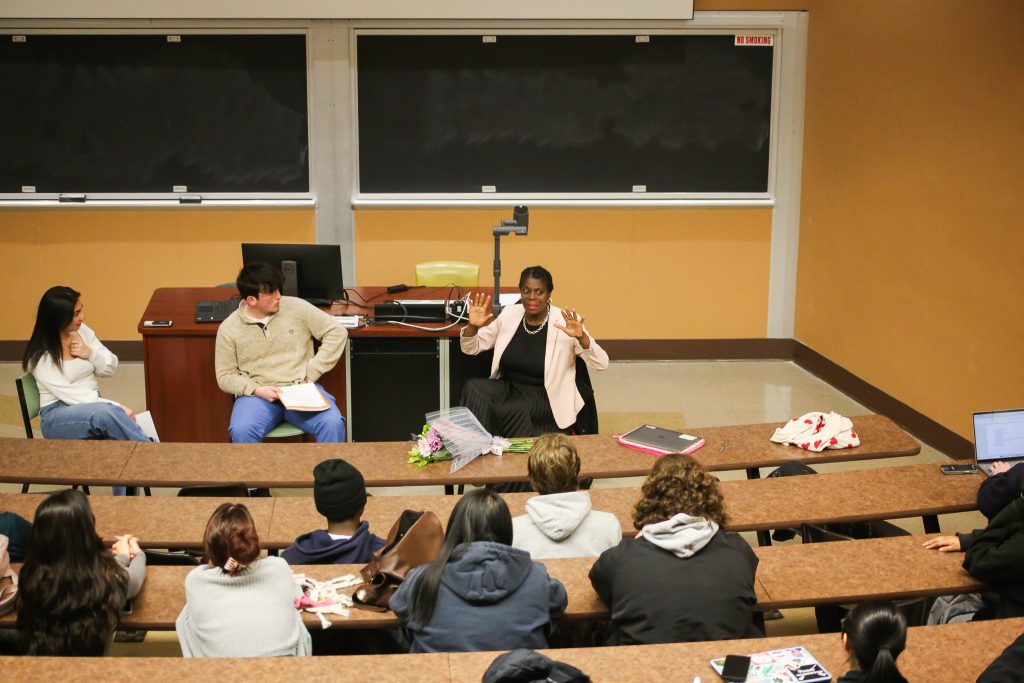To celebrate both Black History Month and Women’s History Month, the Student Association Programming Board (SAPB) hosted the latest event in its Professor Spotlight series.
Held on Thursday in the Lecture Hall, the event featured Anne Bailey, a professor of history and accomplished author who has spoken at the United Nations. Bailey’s distinguished academic career has included extensive research in African, African-American and Caribbean Studies, and members of the campus community listened to her speak about her youth, background and published works.
Chelsea Kaden, the SAPB’s insights chair and a senior majoring in integrative neuroscience, described her goals of promoting diversity and inclusion.
“I hope to give [Bailey] a platform to speak not only about the content of her work, but her passion for it,” Kaden wrote in an email. “Understanding how our professor[s] found their appreciation for their field of study can expand our appreciation for it as well.”
Bailey, the recipient of the Fulbright Program and Coro Fellowship in Public Affairs awards, described her background growing up in Jamaica and her strong ties to the African continent. The Fulbright scholarship allowed her the opportunity to travel to Ghana and Jamaica to research African perspectives of the transatlantic slave trade.
During her time in Ghana, Bailey spoke with locals to hear their oral history, passed down through generations, of the slave trade. Her research included fieldwork, interviews and learning about local culture to gain a fuller understanding of the African perspective.
“It was my curiosity that got me [to Africa], and that’s what I try to encourage in students,” Bailey said. “If you’re curious about something in your classes or just in life in general, honor that. That’s the beginning of not just academic inquiry, but often figuring out your purpose.”
Bailey also discussed her two non-fiction published books — “African Voices of the Atlantic Slave Trade: Beyond the Silence and the Shame” and ”The Weeping Time: Memory and the Largest Slave Auction in American History.” She primarily focused on “The Weeping Time,” which tells the story of an 1857 slave auction in Savannah, Georgia — the largest slave auction in American history. In this book, she highlights “living history,” where past events are connected to current and contemporary issues.
“The living history part of it is that I not only told the history of the sale, but I traced 15 percent of the people sold on the auction block to today, to people like you and me who can tell their story,” Bailey said.
The attention Bailey has brought to this history has resulted in numerous annual commemorations on March 2 and 3 — the days of the auction — throughout Georgia, with people of all cultures uniting to recognize the auction’s horrors and address current issues. A bill to preserve the memory of the Weeping Time and the Weeping Time Corridor has passed Georgia’s General Assembly and will move to the State Senate.
“It’s not just that we’re honoring what happened on the auction block, but [the enslaved people’s] contribution to America,” Bailey said. “They contributed to the richest men in America on the eve of the Civil War, and that means that they contributed to modern America as we know it. But they never got any credit, and that really links to what we have here in Binghamton.”
Bailey spearheaded the Harriet Tubman Freedom Trail in Downtown Binghamton, which commemorates locations central to the Underground Railroad and the Civil Rights Movement, like the Trinity Zion Church and Brigham Hall. It celebrates the important people associated with these events, as a statue of Harriet Tubman marks the trail’s beginning and it concludes with a monument of Martin Luther King, Jr.
She concluded the event with advice for students trying to find their community and path in life.
“Experiment a little bit,” Bailey said. “If you do what you love, and you make the connections to the real world, the world is going to find you.”



